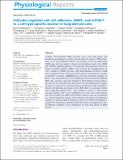| dc.contributor.author | Khabibullin, Damir | en_US |
| dc.contributor.author | Medvetz, Douglas A. | en_US |
| dc.contributor.author | Pinilla, Miguel | en_US |
| dc.contributor.author | Hariharan, Venkatesh | en_US |
| dc.contributor.author | Li, Chenggang | en_US |
| dc.contributor.author | Hergrueter, Anja | en_US |
| dc.contributor.author | Laucho Contreras, Maria | en_US |
| dc.contributor.author | Zhang, Erik | en_US |
| dc.contributor.author | Parkhitko, Andrey | en_US |
| dc.contributor.author | Yu, Jane J. | en_US |
| dc.contributor.author | Owen, Caroline A. | en_US |
| dc.contributor.author | Huang, Hayden | en_US |
| dc.contributor.author | Baron, Rebecca M. | en_US |
| dc.contributor.author | Henske, Elizabeth P. | en_US |
| dc.date.accessioned | 2015-01-05T18:28:34Z | |
| dc.date.issued | 2014 | en_US |
| dc.identifier.citation | Khabibullin, D., D. A. Medvetz, M. Pinilla, V. Hariharan, C. Li, A. Hergrueter, M. Laucho Contreras, et al. 2014. “Folliculin regulates cell–cell adhesion, AMPK, and mTORC1 in a cell‐type‐specific manner in lung‐derived cells.” Physiological Reports 2 (8): e12107. doi:10.14814/phy2.12107. http://dx.doi.org/10.14814/phy2.12107. | en |
| dc.identifier.issn | 2051-817X | en |
| dc.identifier.uri | http://nrs.harvard.edu/urn-3:HUL.InstRepos:13581274 | |
| dc.description.abstract | Abstract Germline loss‐of‐function BHD mutations cause cystic lung disease and hereditary pneumothorax, yet little is known about the impact of BHD mutations in the lung. Folliculin (FLCN), the product of the Birt–Hogg–Dube (BHD) gene, has been linked to altered cell–cell adhesion and to the AMPK and mTORC1 signaling pathways. We found that downregulation of FLCN in human bronchial epithelial (HBE) cells decreased the phosphorylation of ACC, a marker of AMPK activation, while downregulation of FLCN in small airway epithelial (SAEC) cells increased the activity of phospho‐S6, a marker of mTORC1 activation, highlighting the cell type–dependent functions of FLCN. Cell–cell adhesion forces were significantly increased in FLCN‐deficient HBE cells, consistent with prior findings in FLCN‐deficient human kidney‐derived cells. To determine how these altered cell–cell adhesion forces impact the lung, we exposed mice with heterozygous inactivation of Bhd (similarly to humans with germline inactivation of one BHD allele) to mechanical ventilation at high tidal volumes. Bhd+/− mice exhibited a trend (P = 0.08) toward increased elastance after 6 h of ventilation at 24 cc/kg. Our results indicate that FLCN regulates the AMPK and mTORC1 pathways and cell–cell adhesion in a cell type–dependent manner. FLCN deficiency may impact the physiologic response to inflation‐induced mechanical stress, but further investigation is required. We hypothesize that FLCN‐dependent effects on signaling and cellular adhesion contribute to the pathogenesis of cystic lung disease in BHD patients. | en |
| dc.language.iso | en_US | en |
| dc.publisher | Wiley Periodicals, Inc. | en |
| dc.relation.isversionof | doi:10.14814/phy2.12107 | en |
| dc.relation.hasversion | http://www.ncbi.nlm.nih.gov/pmc/articles/PMC4246594/pdf/ | en |
| dash.license | LAA | en_US |
| dc.subject | AMPK | en |
| dc.subject | BHD | en |
| dc.subject | Cell–cell adhesion | en |
| dc.subject | folliculin | en |
| dc.subject | mTOR | en |
| dc.subject | pneumothorax | en |
| dc.title | Folliculin regulates cell–cell adhesion, AMPK, and mTORC1 in a cell‐type‐specific manner in lung‐derived cells | en |
| dc.type | Journal Article | en_US |
| dc.description.version | Version of Record | en |
| dc.relation.journal | Physiological Reports | en |
| dash.depositing.author | Khabibullin, Damir | en_US |
| dc.date.available | 2015-01-05T18:28:34Z | |
| dc.identifier.doi | 10.14814/phy2.12107 | * |
| dash.authorsordered | false | |
| dash.contributor.affiliated | Medvetz, Douglas A | |
| dash.contributor.affiliated | Laucho Contreras, Maria | |
| dash.contributor.affiliated | Li, Chenggang | |
| dash.contributor.affiliated | Yu, Jane J | |
| dash.contributor.affiliated | Zhang, Erik | |
| dash.contributor.affiliated | Khabibullin, Damir | |
| dash.contributor.affiliated | Henske, Elizabeth | |
| dash.contributor.affiliated | Owen, Caroline | |
| dash.contributor.affiliated | Parkhitko, Andrey | |
| dash.contributor.affiliated | Baron, Rebecca | |


